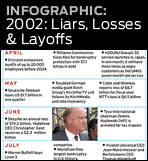What's Wrong With Telecom
Broken business models and crippling debt are the wages of greed, corporate crime, and misguided regulation

This is part of IEEE Spectrum's special report: What's Wrong—What's Next: 2003 Technology Forecast & Review.
Never, since the modern communications industry began in the first half of the 19th century, has it been in worse economic shape than it is today. Through much of last year, it was hardly possible to pick up a newspaper or business magazine without finding a story about a bankruptcy or seeing another once-high-flying magnate being deposed (or maybe even led off in handcuffs).
But what may have eluded you amid the barrage of plunging financial data and stories of lavish lifestyles are the fundamental reasons for the downward spiral. After all, users today are paying for wired and wireless services of unsurpassed variety and utility. We are pretty clearly at the dawn of a networking era in which almost everything we use—and even wear—will be capable of being interrogated and manipulated by means of reliable, always-on, always available, two-way broadband networks. The developed world, at least, is on the path toward the full distance-independent interactive engagement of all our senses.
So why is the business of communications in such dire straits? The problem is a convergence of factors, each of which would have been quite serious by itself. Unfortunately, they came not singly, or even serially, but all at once. In so doing, they triggered what may reasonably be called the Telebomb.
Five costly sins
The Telebomb has five key ingredients:
Greed. Too many companies chased too few customers and—to make matters worse—many were using similar technology.
Corporate crime. As the stupidity of some greed-inspired decisions emerged, some players misrepresented the facts by lying about their financial health (often with the connivance of the accounting and investment communities), thereby destroying investor confidence and casting a cloud of mistrust over the entire communications business.
Misguided regulation. Policies that protected incumbent phone companies but were disguised as competitive reform, like the Telecommunications Act of 1996 in the United States, were the timing mechanism for the Telebomb.
Too much debt. Global Crossing, WorldCom, Qwest, Deutsche Telekom, France Telecom, Lucent, Nortel, Verizon, AOL Time Warner, and others have incurred a collective debt of almost US $2 trillion. Until that debt is somehow made manageable, communications companies [see "Optical Fiber Overcapacity: Serious Disease or Manageable Headache?"] will find the financial markets closed to them.
A broken business model. Although the Internet is truly a wondrous phenomenon, its sudden surfacing in an industry accustomed to slow, carefully thought out ways of making progress (and 30-year depreciation cycles) has so disrupted business models that telecom companies are today giving away services that used to contribute mightily to their revenue streams.
While all the elements are strongly linked, greed and corporate crime are very tightly coupled. Along with misguided regulation, they represent categories of specific actions by individuals or groups. The debt problem and broken business model are two critical outcomes of those actions, abetted, of course, by advances in technology. And as ill luck would have it, they are ongoing, dynamic, festering conditions that make cleaning up after the Telebomb very difficult. Reducing greed, crime, and bad regulations are essential first steps for reducing debt and fixing the business model.
Each of the five ingredients is worth a brief analysis.
Wish List
Inexpensive and faster BROADBAND CONNECTIONS everywhere, instead of just in South Korea, Singapore, and a few other countries
Single worldwide standards, and lower costs, for 3G AND HDTV devices
Pervasive implementation of IPv6, a new Internet protocol (IP) that would allow every object in the known universe to have its own IP address
Lightweight low-power cellphone/PDA/digital camera/MP3 HANDHELD DEVICES that can roam automatically across multiple kinds of networks: Bluetooth, IEEE 802.11, and 3G cellular—and give people a reason to spend more on their phone service
Easy, effective SECURITY TECHNOLOGIES for wireless LANs and virtual private networks
Dark Horse
A spinoff of a spinoff (Lucent Technologies), AVAYA has declining losses, still-robust cash reserves, and plenty of new technology coming from a shiny new lab with over 80 researchers. If the company, which specializes in enterprise and corporate IP-based and legacy phone systems, hangs on for the upturn, it could be a strong performer in a profitable market
Greed is not good
Bear in mind that increasing the world supply of facilities-based service providers—that is, service providers that own their own networks—from several thousand to several tens of thousands did not significantly change the number of customers from whom revenues could be extracted. Each new start-up carrier had to believe, and induce investors and lenders (including equipment suppliers) to believe, that it would be able to wrest market share from those who held it.
Among their exhortations: incumbents won't counter-react; the other guys don't have our talent; and unique new services will win the day and allow us to become profitable quickly. Unluckily for the start-ups, incumbents do know how to defend their turf; and lacking significant new technology, the start-ups had little choice but to choose price as their market differentiator. This proved destructive to everyone: capacity exploded as dumb money chased bad ideas and waited for the other guys to blink, and we are still waiting for those lucrative "new services" that customers will find it impossible to do without. The result: ongoing operating losses, crushing debt, a capacity glut, and seemingly endless price wars.
It seems inexplicable that one of the largest sectors and employers in the global economy—the engine driving most of the world's nonagricultural gross domestic product—is now not just broken but broke. Greed certainly played more than a minor role in this.
Corporate crime
"How do those guys do it?" That is what WorldCom's competitors kept asking themselves as they followed that disgraced company into the financial abyss. It turns out that misstating earnings to the tune of $9 billion was a great way to fool not just investors but also competitors into believing that it could be profitable to sell services below cost. It was also a great way to fuel a price war as competitors broke the business model to compete with WorldCom, making things they once charged for either free or virtually free.
Regulations that mandate deployment may be the only way to ensure the rapid distribution of local broadband facilities
Competitors also boosted their spending on new equipment and mergers and acquisitions to chase the mirage. Now they have spent themselves into a quagmire of debt and in the process have acquired technology that will accelerate the crumbling of what is left of the business model. For example, outfitting computers and next-generation handheld devices of all kinds with the capability to carry voice over networks based on the Internet protocol may well sound the death knell for metered voice services. For another, the explosive growth of new wireless technologies like IEEE 802.11 and Bluetooth make it possible to provide ubiquitous broadband service over meshed network facilities neither owned nor controlled by traditional carriers.
Misguided regulation
In parts of the world (South Korea is the best example), the ubiquitous availability of interactive broadband communications at reasonable rates is seen as essential to the development, and ultimately the competitiveness, of a country. Not only does South Korea have the highest penetration of wired broadband homes and businesses in the world right now, but it recently committed to hooking up its entire population by 2008. Contrast this with the United States, where public policy requires that broadband Internet access be treated differently depending on whether it is delivered over cable or over traditional telephone facilities.
Regulation in the United States is based on the belief that government can do better than the market to ensure universal availability of telecom services at reasonable rates. But in fact, the only thing that U.S. regulations seem interested in ensuring is old-fashioned dial-tone service. Broadband utility service, which much of the rest of the developed world views as a necessity, is left to the mercies of the marketplace—a marketplace that has turned out to be far from the competitive ideal.
This policy's results are not encouraging. Within a year, over 85 percent of U.S. homes will be passed by broadband lines—that is, they will be close enough to those lines to be connected to them; yet only about 20 percent of these homes will actually order the service. On top of this, U.S. Federal Communications Commission (FCC) chairman Michael Powell and Representative Billy Tauzin (R-La.), chair of the House Committee on Energy and Commerce, now talk of granting further immunities to the very same regulated entities that have failed to make broadband service universally available.
To make matters worse, the same companies that own the wires own the vast majority of wireless assets. Lacking competitive pressure, they have little motivation to deploy next-generation wireless service, which requires a very substantial investment and in its present form doesn't seem to promise sufficient return on that outlay.
Revised regulations that mandate deployment rather than protect incumbents are not only viable, they may be the only way to ensure the rapid distribution of local broadband facilities at reasonable rates. In the United States, at least, it's not just the industry that needs fixing: regulation does, too.
Unsung Hero
Digital cowboy DAVE HUGHES has been using a variety of spread-spectrum technologies to connect rural communities in Wyoming and Montana to the Internet for over 15 years. By putting libraries, one-room schoolhouses, and farms online, the retired Army colonel is a model and an inspiration to other wireless warriors
Under Fire
STEVE CASE, AOL founder and current AOL Time Warner chair, is increasingly isolated; executives from the Time Warner side are now firmly in control. Expectations of solid ad revenues have proven illusory, and perhaps fraudulent; AOL's pre-merger accounting methods are under investigation. And it may have to write off even more good will, after reducing it by a mind-bending US $54 billion in 2002
Too much debt
What happens when too many companies chase too few customers with too similar products? When they believe that owning facilities is the way to own customers? When they are urged to buy communications infrastructure around the world at grossly inflated prices? When the people urging them are fee-seeking financial advisors whose analysts, laboring under a severe conflict of interest, are at the same time touting to an unsuspecting public the creed that "prospects are unlimited, we are living through a valuation paradigm shift"? How about when equipment vendors eager to boost their sales (and market value) extend credit to enterprises that cannot be deemed creditworthy by any objective standard?
What happens is you get what we have: overcapacity, little spending on new equipment, companies defaulting on their financial obligations in previously unheard-of numbers up and down the industry supply chain, a ton of finger pointing, and a bunch of wealthy lawyers.
Bad as the other problems are, job No. 1 is to restructure the industry in order to manage down its $2 trillion of debt, to end the malaise. We are still early in the global industry- and debt-restructuring cycle. Elements of the solution will include: extensive industry consolidation as the strong cherry-pick the assets of the weak at steep discounts and force the elimination of nonperforming assets; enormous writedowns of outmoded plant; spectacular bankruptcies of former industry stalwarts in the equipment and services sectors; massive government intervention in countries where incumbent financial ties remain strong (such as the recently proposed $9 billion bailout of France Telecom by the French government), and/or a complete forgiveness on the 3G auction obligations. Indeed, the consensus of industry executives and observers is that before things can get better, they are actually going to get worse for the next few quarters.
The broken business model
Telecom's unworkable business model will be the subject of numerous business books in the coming years. The easiest way to understand it is within the context of one's own experience.
The world was once a place in which scarce information was accessed over a few expensive monopoly networks like the Bell System in the United States. Prices were high, and all but local services were metered, not provided on a flat-rate basis. Into this setting entered all of the information technology and communications technology of the past 20 years. Much that was scarce became abundant. Information got digitized. Access to it proliferated, becoming inexpensive and commodity-like. The communications industry lost its ability to charge for the things it had always charged for: time and distance in the form of voice minutes between specific geographic locations.
In the telecom industry, metered voice has traditionally generated the bulk of the profits. Data, despite now being the bulk of traffic, was and is only marginally profitable; it is mostly flat rate. Voice is moving in that direction, too. If the trend continues, what will pay the bills in the world of the future?
In cable TV, flat rates and advertising don't cover the rising cost of content. Hence, the desire of operators for pay-per-view and other metered services. Video-on-demand and inexpensive voice services are two possibilities that spring to mind.
For the telephone companies, as mentioned earlier, the prospects of sending voice over data networks and uncontrollable wireless deployment are frightening: the first takes the biggest revenue source off the meter; the second could take traffic completely off the network. The value of facilities management will continue to diminish as value shifts to the nonmonopoly "intelligent" part of networking. Technology might finish off what greed, malfeasance, and irrational business and public policy behavior got started.
Is there hope?
The short answer: yes. All the clichés apply: "Nothing lasts forever," "This too shall pass," and so on. In fact, the industry is already addressing the timely issues of illegal and/or irrational behavior by individuals.
It is a question of when, not if, new industry leadership will restore trust by managing down debt and producing positive service experiences for customers, as well as positive financial ones for investors.
Fixing the business model is more problematic. It will get fixed, to be sure, because in a world that is ever more network-centric, what the network does and delivers will always be valuable.
But figuring out exactly where that value lies is still a challenge. When the dust settles, the surviving and successful players will be those among the new and established players who figure out exactly what it is about a network that is most valuable, how they could maximize that value in their networks, and—most importantly—how they could best get potential customers to recognize that value and become willing to pay a premium for it.
Even the worst of storms dissipate as they move into new waters, and bombed-out landscapes almost always come back looking better than ever. But when they emerge from the shadow of destruction, they invariably look different. Old buildings disappear and new ones take their places. There is every reason to believe that history will repeat itself in the aftermath of the Telebomb.

